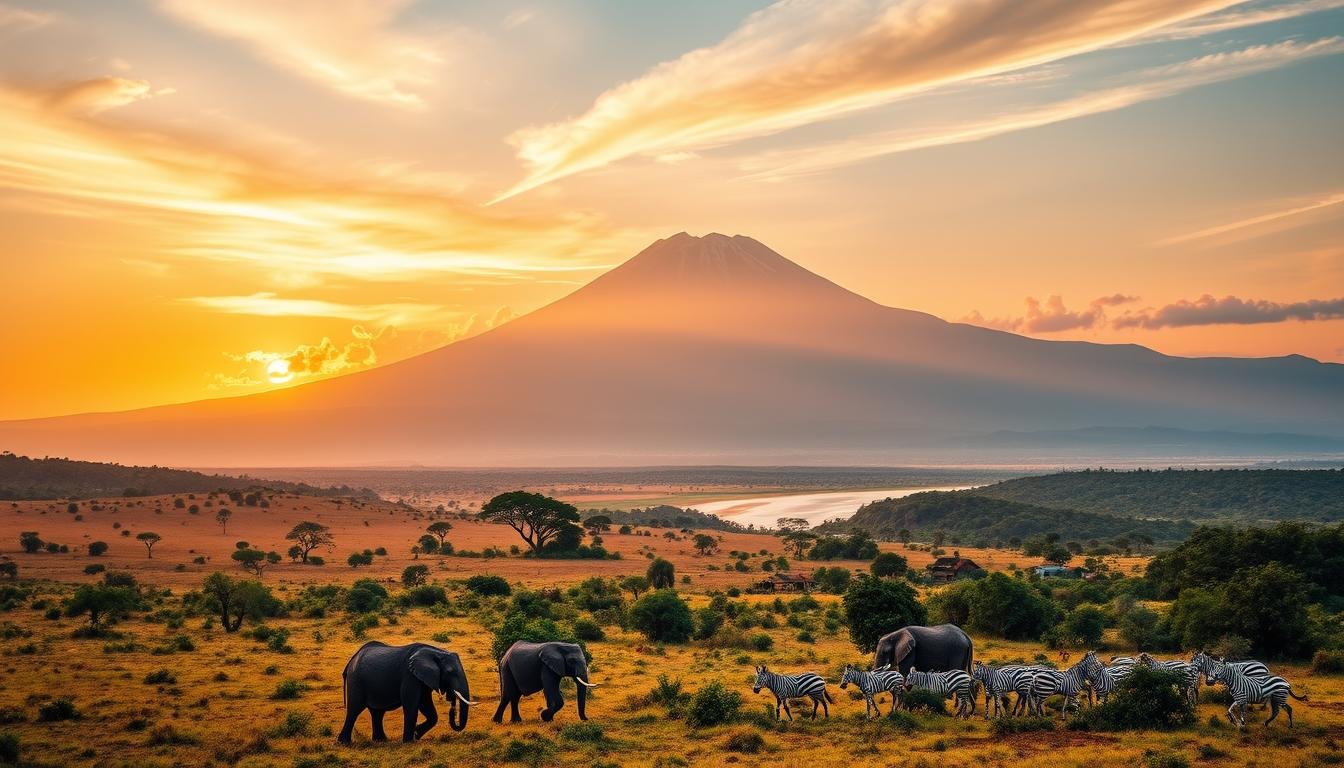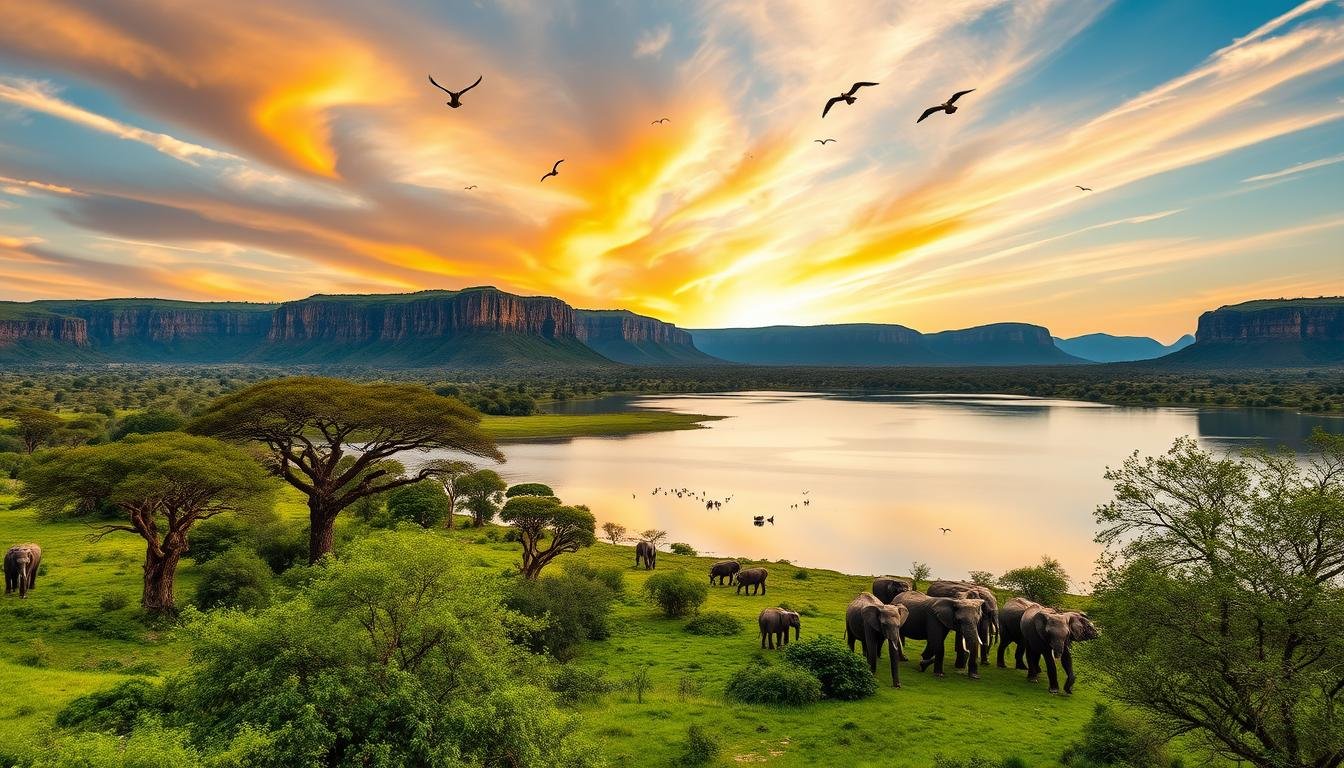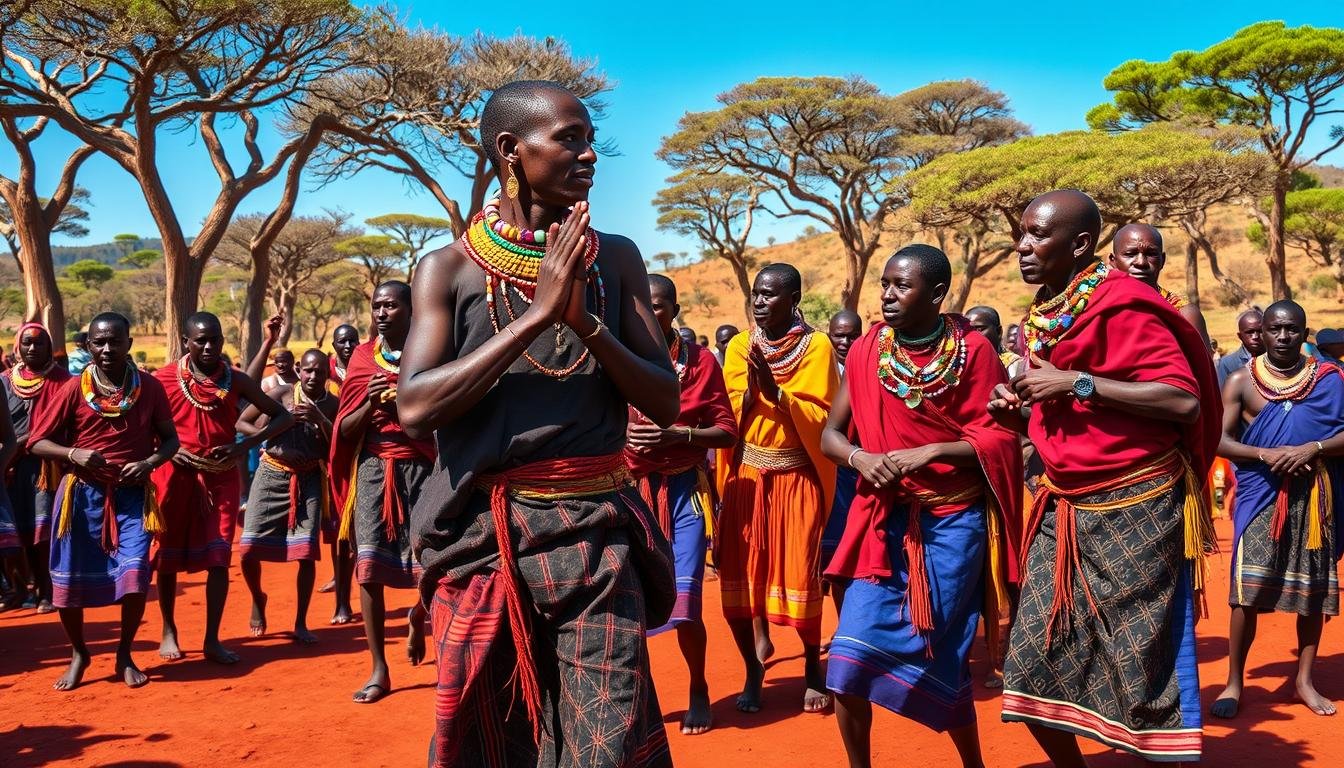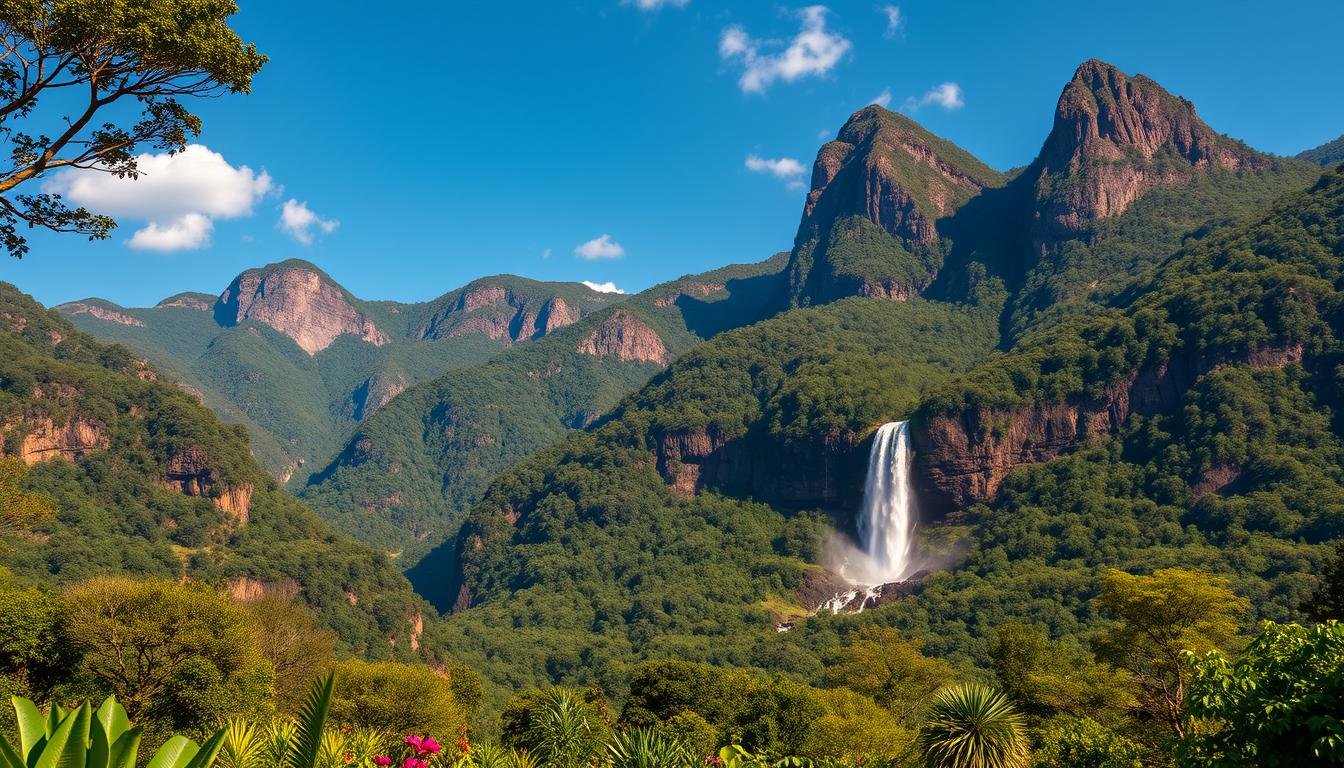Tanzania is a stunning East African country filled with natural wonders and cultural richness. It boasts the famous Serengeti National Park and Mount Kilimanjaro. You can also enjoy Zanzibar’s beautiful beaches and the Ngorongoro Crater’'s breathtaking views.
The Ngorongoro Crater is a UNESCO World Heritage Site with a unique ecosystem. The dry season from June to October is best for seeing animals. The wet season, from November to May, is green and full of birds.
The best times to climb Mount Kilimanjaro are from January to March and June to October. The Machame Route is famous for its beauty and gentle trek. The Rongai Route offers a quieter, more secluded trek.
Zanzibar is known as the “Spice Island” It’s famous for its spice tours and fragrant spices. The food is a mix of African, Arab, and Indian flavors.
The Southern African rainforest is home to a variety of species. The rainforests are rich in biodiversity, which can be found all over the world.
The Selous Game Reserve is Africa’s biggest protected area. Visitors can enjoy thrilling boat safaris along the Rufiji River. The Ruinsori Mountains have many hiking trails, each with its own charm and challenge.
The Ruinsori Mountains are a dream for photographers. They offer stunning views that will amaze you. Dar es Salaam, Tanzania’s largest city, is a treasure trove of culture.
Tanzania is a land of diverse cultures. Visiting traditional villages lets us dive into the vibrant Maasai culture. We can see the real Tanzanian crafts up close.
The Udzungwa Mountains are part of the Eastern Afromontane biodiversity hotspot. This area is known for its high plant and animal diversity. There are over 400 bird species for birdwatchers to enjoy.
Tanzania’s stunning coastline is a paradise for those who love the sea. The Indian Ocean’'s warm, clear waters are perfect for snorkeling and diving. You can see colorful coral reefs, tropical fish, sea turtles, and more.
Chumbe Island, Mnemba Atoll, and Bawe Island lagoon are great spots for snorkeling. Pemba Island and the Songo Songo Archipelago are also great for diving. Gombe Stream National Park is a treasure along Lake Tanganyika’s shores.
Plan to stay for at least 7-10 days. This gives you enough time to see the Serengeti, Ngorongoro Crater, and Mount Kilimanjaro. Visitors to Gombe Stream National Park can see amazing chimpanzee behavior.

16 Nov
What to see in Tanzania: Tanzania is a stunning East African country filled with natural wonders and cultural richness. It boasts the famous Serengeti National Park and Mount Kilimanjaro. You can also enjoy Zanzibar‘s beautiful beaches and the Ngorongoro Crater’s breathtaking views. This guide will help you discover the best spots in Tanzania for an unforgettable trip.
Key Takeaways
- Tanzania offers a vast array of natural wonders, from the Serengeti’s wildlife to the Ngorongoro Crater’s unique ecosystem.
- Iconic landmarks like Mount Kilimanjaro and the beaches of Zanzibar are must-visit destinations for adventurous travelers.
- Immersive cultural experiences, such as interacting with the Maasai people and exploring traditional villages, provide a deeper understanding of Tanzania’s rich heritage.
- Tanzania’s national parks and game reserves provide unparalleled safari opportunities to witness the country’s diverse wildlife in their natural habitats.
- Coastal and marine attractions, including snorkeling, diving, and water sports, offer a perfect balance of relaxation and adventure.
Discovering Serengeti National Park
Serengeti National Park is a top spot in Tanzania for wildlife lovers. It offers a unique safari experience. You’ll see diverse ecosystems and the famous wildebeest migration.
Overview of the Serengeti
The Serengeti is a huge, grassy area in northern Tanzania and Kenya. It’s full of wildlife, like the Big Five and many more animals. You can see huge herds of wildebeest migrating every year.
Wildlife Safari Experiences
A safari in the Serengeti is unforgettable. You’ll see amazing wildlife, from predators to huge wildebeest herds. There are many ways to experience it, like game drives, hot air balloon rides, and walking safaris.
Best Times to Visit
The Serengeti is great to visit all year. But, the wildebeest migration in June to October is a must-see. The river crossings in July and August are especially exciting.
The dry season from June to October is best for seeing animals. They gather around water sources, making them easy to spot. The wet season, from November to May, is green and full of birds, offering a different experience.
Altezza Travel offers great safari and hiking trips in Tanzania. They can help plan your Serengeti adventure. Their team ensures you have the best time in this amazing place.
Best Time to Visit SerengetiHighlights
June to October
Wildebeest migration, abundant wildlife sightings
November to May
Lush greenery, migratory birds, fewer crowds
Exploring Ngorongoro Crater
The Ngorongoro Crater is in the heart of Tanzania. It’s a UNESCO World Heritage Site with a unique ecosystem. This ancient caldera, formed millions of years ago, is a natural wonder that attracts visitors worldwide.
Unique Ecosystem and Biodiversity
The Ngorongoro Crater is full of diverse flora and fauna. You’ll see large herds of wildebeest and zebra. Also, look out for black rhinos and African elephants.
The crater has different habitats like grasslands, forests, and lakes. These support a thriving ecosystem. It shows the region’s incredible biodiversity.
Cultural Significance of Maasai
The Ngorongoro Crater is important to the Maasai people. They have lived here for centuries. Their way of life is closely tied to the land.
Visitors can learn about Maasai culture. They can see their traditional dress and customs. They also learn about their relationship with nature.
Scenic Viewpoints
The Ngorongoro Crater has stunning views from various spots. The rim offers panoramic views of the landscape below. The floor provides a close look at the wildlife.
Whether you want wide views or close wildlife encounters, the Ngorongoro Crater impresses. It leaves a lasting impression on all who visit.
> “The Ngorongoro Crater is a truly remarkable place, where the past and present coexist in perfect harmony. It’s a testament to the resilience of nature and the enduring spirit of the Maasai people.”
Visiting Mount Kilimanjaro
Mount Kilimanjaro stands tall in Tanzania, calling to adventurers from everywhere. It’s Africa’s highest peak, a thrilling climb for those who love to trek and climb. Let’s look at the best ways to reach the top of this iconic mountain.
Trekking Routes and Challenges
There are many trekking routes on Mount Kilimanjaro, each with its own charm and challenges. The Machame Route is famous for its beauty and gentle climb. The Rongai Route offers a quieter, more secluded trek. No matter the route, climbers face physical and mental hurdles, like altitude sickness and harsh weather.
Necessary Gear and Preparation
- Proper hiking boots with good traction and ankle support
- Warm, layered clothing to adapt to changing temperatures
- Lightweight and breathable fabrics for the trek
- Hiking poles to ease the strain on joints
- Headlamps and extra batteries for night treks
- High-calorie snacks and plenty of water to stay fueled
Along with the right gear, climbers need to train and acclimatize. Getting advice from guides and outfitters can make the climb safer and more successful.
Best Seasons for Climbing
The best times to climb Mount Kilimanjaro are from January to March and June to October. These months have clear skies, mild temperatures, and less rain. But, the mountain’s weather can change quickly, so climbers must always be ready for surprises.
> “The journey to the top of Mount Kilimanjaro is as much a physical challenge as it is a mental one. But the sense of accomplishment and the breathtaking views from the summit make it all worth the effort.”
Relaxing on Zanzibar Island
Zanzibar Island is a tropical paradise off Tanzania’s coast. It has beautiful Zanzibar beaches, a rich culture, and amazing spice tours. We’ll find the best beaches, try local food, and learn about the Old Stone Town.
Beaches to Enjoy
Zanzibar’s beaches are stunning. They invite you to sunbathe, swim, and enjoy the calm. Nungwi in the north and Kendwa are perfect for relaxation or romance. Zanzibar’s beaches are a peaceful escape.
Spice Tours and Culinary Delights
Zanzibar is known as the “Spice Island.” It’s famous for its spice tours and fragrant spices. The island’s food is a mix of African, Arab, and Indian flavors. It’s a feast for your senses.
Cultural Heritage Sites
The Old Stone Town is Zanzibar’s cultural heart. It’s a UNESCO World Heritage Site. Here, you’ll see a mix of architectural styles. It’s a journey through Zanzibar’s history and traditions.
> “Zanzibar is a tropical paradise that captivates the senses with its pristine beaches, rich cultural heritage, and aromatic spice tours. It’s a destination that invites you to slow down, savor the moment, and immerse yourself in the island’s enchanting charm.”
Experiencing Tarangire National Park
Tarangire National Park is a hidden gem in northern Tanzania. It’s known for its diverse wildlife and stunning landscapes. The park is famous for its large elephant populations, which migrate through the park every year.
Elephant Migration and Wildlife Spotting
The park’s main attraction is the elephant migration. Thousands of elephants move across the plains, gathering at the Tarangire River. This river is crucial for them during the dry season. Tarangire is also home to giraffes, zebras, wildebeests, lions, and more.
Landscape and Scenery Highlights
The park’s landscape is marked by iconic baobab trees. These trees create a unique and stunning view. Tarangire’s ecosystems vary from lush forests to golden savannas. Each offers a different view of the region’s natural beauty.
Visitor Tips for a Memorable Trip
- Go on an early morning or late afternoon game drive for the best wildlife sightings.
- Bring binoculars and a camera to capture the park’s beauty and wildlife.
- Don’t forget to pack water and sun protection, as the sun can be strong.
- Stay at one of the park’s lodges or tented camps for a full experience.
A visit to Tarangire National Park is unforgettable. You’ll see majestic elephants, diverse landscapes, and many wildlife species. With good planning and a sense of adventure, your Tanzanian safari will be unforgettable.
Delving into Lake Manyara National Park
Lake Manyara National Park is in the heart of Tanzania. It’s a treasure for those who love nature. The park has beautiful landscapes, amazing birdwatching, and tree-climbing lions.
Birdwatching Opportunities
The park is famous for its birdwatching. It has over 400 bird species. You can see pink flamingos and majestic raptors here.
Unique Flora and Fauna
The park is full of amazing plants and animals. You can see forests, grasslands, and iconic African wildlife. The tree-climbing lions are a must-see.
Historical Significance
Lake Manyara National Park is important for Tanzania’s conservation. It was created in 1960 to protect the wildlife and ecosystems. Visitors can learn about its history and conservation efforts.

> “Lake Manyara National Park is a true testament to the natural beauty and diversity of Tanzania. From the captivating birdlife to the remarkable tree-climbing lions, it’s a destination that leaves a lasting impression on all who visit.”
Encountering the Selous Game Reserve
The Selous Game Reserve is in southern Tanzania. It’s Africa’s biggest protected area. It offers a vast and diverse wilderness for adventurous travelers. This UNESCO World Heritage Site covers over 54,600 square kilometers.
Overview of Activities
Visitors can enjoy thrilling boat safaris along the Rufiji River. They can see crocodiles, hippos, and many birds. Guided walking safaris let guests explore the reserve’s rugged terrain.
They can see iconic Selous Game Reserve wildlife like elephants, lions, and leopards up close.
Conservation Efforts in Selous
The Selous Game Reserve leads in conservation in Tanzania. Teams work hard to protect the area’s rich biodiversity. They do anti-poaching patrols and use sustainable management.
Visitors can learn about these efforts and help preserve this natural wonder during their stay.
Best Time to Visit
- The best time to visit the Selous Game Reserve is from June to October. Wildlife gathers around water sources, making spotting easier.
- From November to May, the wet season, the landscape is lush. It’s perfect for boat safaris and photography.
The Selous Game Reserve offers unforgettable safari experiences. It’s great for wildlife encounters and exploring a well-preserved ecosystem. With its diverse activities and focus on conservation, it’s a must-see for Tanzania travelers.
Adventuring in Ruinsori Mountains
The Ruinsori Mountains in Tanzania are a thrilling spot for outdoor fans and nature lovers. Its rugged terrain and stunning views make it a must-see. Whether you’re an experienced hiker or new to exploring, there’s something for everyone.
Hiking Trails and Difficulty Levels
The Ruinsori Mountains have many hiking trails, each with its own charm and challenge. You can find easy paths or tough routes, depending on your skill level. For those who love long hikes, there are multi-day treks through forests and mountains. For a quick adventure, try day hikes to beautiful spots.
- Beginner-friendly trails: These paths are easy and great for new hikers or families.
- Intermediate trails: These are a bit tougher but still doable. They offer steeper climbs and rocky terrain.
- Advanced trails: These are for the seasoned hiker. They require skill, fitness, and a love for adventure.
Stunning Views and Photography Tips
The Ruinsori Mountains are a dream for photographers. They offer stunning views that will amaze you. Every turn reveals a new, breathtaking sight. Here are some tips to capture the beauty:
- Visit during golden hour for the best light.
- Try different angles and lenses to show the mountains’ grandeur.
- Use a tripod for clear, long shots.
- Watch the weather and light to change your photos’ mood.
Looking for a tough hike or amazing photos? The Ruinsori Mountains are perfect. Bring your gear, wear your hiking boots, and start an unforgettable journey in Tanzania.
Enjoying the Culture of Dar es Salaam
Dar es Salaam, Tanzania’s largest city, is a treasure trove of culture. It’s the heart of the nation’s economy and culture. Here, visitors can dive into a world of museums, markets, and festivals.
Museums and Historical Sites
Visit the National Museum of Tanzania to learn about the country’s history. See traditional art, archaeological finds, and exhibits that show Tanzania’s cultural journey.
Local Markets and Cuisine
Experience Tanzanian cuisine at the city’s lively markets. Enjoy the smells of spices and fresh food. Talk to vendors and try local dishes that highlight the area’s flavors.
Festivals and Events to Experience
Dar es Salaam hosts many cultural festivals all year. Events like the Sabasaba International Trade Fair and Mwaka Kogwa Festival showcase Tanzanian traditions, music, and dance.
Exploring museums, trying local food, and attending festivals in Dar es Salaam is unforgettable. It’s a journey that will stay with you long after you leave Tanzania.
Traditional Villages We Can Visit
Tanzania is a land of diverse cultures. Visiting traditional villages lets us dive into the vibrant Maasai culture. We can see the real Tanzanian crafts up close.
These villages show us the daily lives and traditions of local communities. We can make meaningful connections and appreciate Tanzanian heritage more.
Interactions with Local Communities
In these villages, we’ll meet the locals and learn about their customs. We’ll see traditional practices that have been passed down for generations. From beadwork to cultural rituals, these experiences will leave a lasting impression.
Authentic Cultural Experiences
Visiting these villages, we can dive into real cultural experiences. We might attend a traditional dance, learn spear-throwing, or weave baskets. These activities let us see the skill and dedication in preserving traditions.
Craft and Artisanal Offerings
Visiting these villages, we’ll find a wealth of Tanzanian crafts. We’ll see vibrant textiles, intricate beadwork, and more. We can talk to the artisans, learn about their work, and even buy unique souvenirs.

> “Immersing ourselves in the traditional villages of Tanzania allows us to connect with the heart and soul of this captivating country, where ancient customs and modern-day realities coexist in a harmonious tapestry.”
Safari Options in Mikumi National Park
Mikumi National Park is in the heart of Tanzania. It’s a great place for wildlife viewing. The park has many animals and beautiful landscapes, offering different safari options.
Key Wildlife to See
The park is home to many animals, like African elephants and lions. You can also see giraffes, zebras, and wildebeests. There are over 400 bird species for birdwatchers to enjoy.
Accessibility and Visitor Information
- Mikumi National Park is easy to get to, just a few hours from Dar es Salaam.
- There are many places to stay, from tented camps to lodges, for all budgets.
- Guided safaris let you see wildlife up close. You can go by car or on foot.
- Experienced guides are there to help and make your safari better.
Looking for a thrilling game drive or a calm walking safari? Mikumi National Park has it all. Plan your trip and explore Tanzania’s beautiful landscapes.
Exploring the Udzungwa Mountains
The Udzungwa Mountains in Tanzania are a true hidden gem for nature lovers. This biodiversity hotspot is home to many rare and endemic species. It’s a top spot for wildlife fans and hikers.
Biodiversity Hotspot Highlights
The Udzungwa Mountains are part of the Eastern Afromontane biodiversity hotspot. This area is known for its high plant and animal diversity. It has over 2,500 species of vascular plants, with 30% found nowhere else.
It’s also a safe haven for endangered species. These include the Udzungwa red colobus monkey, Sanje mangabey, and the elusive African elephant.
Hiking and Nature Trails
- The Udzungwa Mountains offer a range of hiking opportunities for all.
- The Ndundule Forest Reserve is a favorite trail. It takes you through lush forests and past waterfalls.
- The Mwanihana Trail is for the more adventurous. It’s steep but offers stunning views.
- Along the trails, you can see many bird species. This includes the Udzungwa partridge and the Ayre’s hawk-eagle.
The Udzungwa Mountains show Tanzania’s amazing biodiversity and natural beauty. Whether you love nature, hiking, or adventure, this place will impress you.

FactValue
Total Area of Udzungwa Mountains
13,626 sq km
Number of Endemic Plant Species
over 30%
Endangered Animal Species
Udzungwa red colobus monkey, Sanje mangabey, African elephant
Popular Hiking Trails
Ndundule Forest Reserve, Mwanihana Trail
Journeying to Mafia Island
Mafia Island is a hidden gem off Tanzania’s coast. It’s perfect for those who love eco-tourism and marine life. The island is known for its stunning underwater sights and dedication to green tourism.
Marine Life and Diving Spots
Mafia Island has some of the most vibrant marine life in the world. Under the clear waters, you’ll find colorful coral reefs full of life. You can see tropical fish and even whale sharks.
The island’s best diving spots, like Kinasi Pass and Jibondo, are amazing. Divers can see many marine species, including rare ones. Snorkelers will love the shallow, blue lagoons full of life.
Relaxation and Eco-Tourism
Mafia Island is more than just marine life. It’s a peaceful place for eco-tourism. The island has beautiful beaches and a relaxed vibe. You can try kayaking, paddleboarding, and yoga on the beach.
The local community works hard to protect the island. They focus on eco-friendly tourism. You can help with turtle conservation and sustainable fishing.
Mafia Island is great for both adventure and relaxation. It’s a place that will stay with you long after you leave.
Coastal and Marine Attractions
Tanzania’s stunning coastline is a paradise for those who love the sea. It boasts beautiful Zanzibar beaches and a rich underwater world. This place is a dream come true for water lovers.
Snorkeling and Diving Experiences
The Indian Ocean’s warm, clear waters are perfect for snorkeling and diving. You can see colorful coral reefs, tropical fish, sea turtles, and more. Chumbe Island, Mnemba Atoll, and Bawe Island lagoon are great spots for snorkeling.
For a deeper dive, Tanzania has amazing sites. At Mafia Island Marine Park, you can see whale sharks, manta rays, and many other sea creatures. Pemba Island and the Songo Songo Archipelago are also great for diving, with their vibrant marine life and wreck dives.
Kayaking and Water Sports Options
Tanzania’s coastline also offers other water activities. You can kayak through mangrove-lined shores, seeing birds and fishing villages. For thrill-seekers, there’s stand-up paddleboarding, kitesurfing, and windsurfing to explore the Zanzibar beaches and the sea.
ActivityLocationHighlights
Snorkeling
Chumbe Island, Mnemba Atoll, Bawe Island
Vibrant coral reefs, diverse marine life
Diving
Mafia Island Marine Park, Pemba Island, Songo Songo Archipelago
Whale sharks, manta rays, wreck diving
Kayaking
Mangrove-lined shores
Birdwatching, traditional fishing villages
Water Sports
Zanzibar beaches
Stand-up paddleboarding, kitesurfing, windsurfing
Looking for a calm snorkeling trip or an exciting water sport? Tanzania’s coast has it all for an unforgettable adventure.
Excursions to Gombe Stream National Park
Gombe Stream National Park is a treasure along Lake Tanganyika’s shores. It’s famous for Jane Goodall’s chimpanzee research. Here, you can see our closest relatives in their natural home.
Chimpanzee Tracking Adventures
Visiting Gombe Stream National Park means going on chimpanzee tracking adventures. You’ll follow these smart primates as they search for food and socialize. Seeing them in the wild is both exciting and humbling.
The park’s guides know a lot about chimpanzees. They lead you through the forest, sharing stories that make the chimpanzees’ lives come alive.
Importance of Conservation Efforts
Protecting Gombe Stream National Park and its chimpanzees is crucial. The park is a key place for these animals, but they face dangers like habitat loss and poaching. Thanks to teamwork between the government, conservation groups, and locals, the park and its animals are safe for now.
Visitors to Gombe Stream National Park can see amazing chimpanzee behavior. They also help with conservation by supporting the park through eco-tourism. This helps ensure the survival of these incredible animals and their homes.
An excursion to Gombe Stream National Park is unforgettable. It’s a chance to see chimpanzees up close and learn about conservation. You’ll understand how fragile yet strong our natural world is.
Planning Our Perfect Tanzanian Itinerary
Creating the perfect Tanzanian itinerary means thinking about all the amazing things to see and do. You might want to go on a safari, climb a mountain, or relax on the beach. We’ve got tips for all of these.
Suggested Timeframes for Visits
For a full Tanzanian experience, plan to stay for at least 7-10 days. This gives you enough time to see the Serengeti, Ngorongoro Crater, and Mount Kilimanjaro. If you have more days, you can explore more, like Zanzibar’s beaches or the Selous Game Reserve.
Balancing Adventure and Relaxation
To get the best of both worlds, mix adventure and relaxation in your trip. Start with the Serengeti, then head to Ngorongoro Crater. After that, relax on Zanzibar’s beaches or Mafia Island.
Finally, tackle Mount Kilimanjaro or explore Tarangire National Park. This way, you’ll enjoy Tanzania’s beauty and have time to rest and enjoy the moment.
